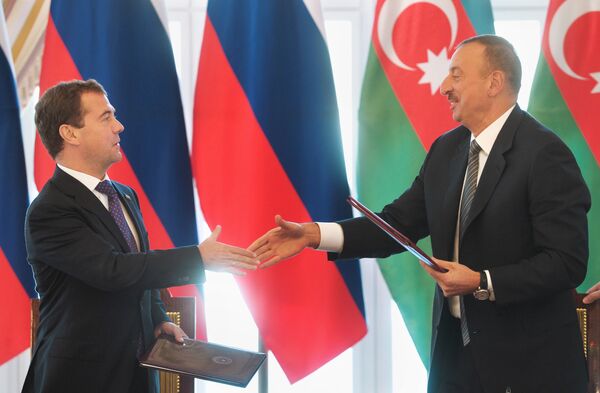In connection with the recent visits of Russian president Dmitry Medvedev to Armenia and Azerbaijan political analyst Viktor Nadein-Rayevsky, a senior fellow of the Russian Academy of Sciences’ Institute of World Economy and International Relations assesses geopolitical situation in the region and gives his opinion on the ambitions of other regional powers – Turkey and Iran.
Samir Shahbaz: What are Russia’s geopolitical interests in the South Caucasus?
Viktor Nadein-Rayevsky: Russia views the Caucasus security as an important issue. Consequently, we display caution on Nagorno-Karabakh issues and try to relegate them to the concerned parties, without dictating anything to anyone. Of course, we would like to see equitable and well-balanced international cooperation here. External influence should not upset the current balance because disruption could lead to unpredictable consequences. And nobody needs a new war. At any rate, Russia does not need such a war.
Shahbaz: Who would be interested in disrupting today’s relative stability in the region?
Nadein-Rayevsky: To be honest, this question implies only those who are interested in strengthening their own positions and weakening the positions of the main regional powers, primarily Russia. I don’t want to directly accuse any Western governments of this. But, judging by the actions of some non-regional players, it appears that their policy was aimed at upsetting the balance. At any rate, this is true of the developments in Georgia. Similar attempts are possible with regard to Azerbaijan. It appears that perfidious and dangerous information bombs implying that Azerbaijan planned to provide bases for U.S. forces, including those for operations against Iran, were not “dropped” by sheer coincidence. Azerbaijan emphatically denies any actions or even attempted actions against Iran. This is a correct stance because the situation might otherwise get out of control.
Shahbaz: What do you think about the actions of the two other important players bordering on the region, namely, Iran and Turkey?
Nadein-Rayevsky: Both countries have recently become visibly active in their own way. Previously, the Turkish policy could be perceived as a continuation and sharp point on the NATO “sword” in the eastern Mediterranean region. But the situation has now changed. The Republic of Turkey has long been formulating its policy in line with its national interests. The West, which is not used to this, frequently disapproves of various Turkish actions. In some cases, they even mention a veritable Russian-Turkish alliance which, of course, amounts to idle talk. Naturally, any strategic military alliance is also out of the question. These countries have different interests and goals. Nevertheless, there are common venues of cooperation, including the stabilization of the Caucasus.
As far as Azerbaijanian-Turkish relations are concerned, both countries signed a strategically important treaty prior to Dmitry Medvedev’s visit to Yerevan. They say Turkey voices an absolutely pro-Azerbaijanian stance on many issues, primarily Nagorno-Karabakh. To be fair, it should be noted that the Turkish Government does not go to extremes and acts in line with the real situation. Turkey, an influential regional player, hopes to obtain sizeable dividends from its active policy. Turkey wants to become a key energy hub for the transportation of energy resources to western, central, southern and even northern Europe. Some projects, including the Baku-Tbilisi-Ceyhan crude oil pipeline, are currently being implemented.
Turkey also prioritizes relations with Iran because it receives natural gas from them. This does not always go smoothly, and acts of sabotage have taken place. Moreover, Turkey is seriously interested in developing Iranian mineral deposits. Although the United States reproaches and even threatens Turkey, Ankara invests in Iran. This is happening at a time when Washington has imposed serious sanctions on investment in Iran. Previously, it was forbidden to invest over $20 million in various energy projects in Iran. And now such restrictions have become even more strict. Western Europe is also involved in these sanctions. They are assuring us that such sanctions are not directed against the Iranian nation’s well-being. But an objective assessment of the situation shows that all this is empty talk. Of course, sanctions take their toll. By restricting gasoline exports to Iran, the West is dealing a serious blow against the everyday life of Iranians. Iran which lacks refineries has to import most of its petroleum. Just like Russian companies, Turkish companies have ignored the ban and trade with Iranians. Although Turkey is a NATO member, it has not joined the sanctions, continues to improve relations with Iran and maintains permanent bilateral contacts. However, Western conjecture about an Iranian-Turkish alliance and some kind of Islamic solidarity are groundless. Both countries preach Shia and Sunni Islam. However, Shia Muslims account for 8% of the Turkish population, Shia Islam is not popular in Turkey. So, any talk of Islamic unity is far-fetched. But economic interests are an important factor. And Turkey is willing to facilitate Iranian oil and gas transits via its territory, although much remains to be done in this respect.
Speaking of Iran’s interests in the Caucasus, Tehran has repeatedly offered its services in settling the Nagorno-Karabakh conflict. Iran is willing to act as a mediator in this area. Iran maintains a sufficiently cautious policy which is non-hostile toward Armenia. This could be expected in connection with good-neighborly Iranian-Azerbaijanian relations. Moreover, Iran trades with Armenia, supplying gas and building railroads together with transport monopoly Russian Railways.



